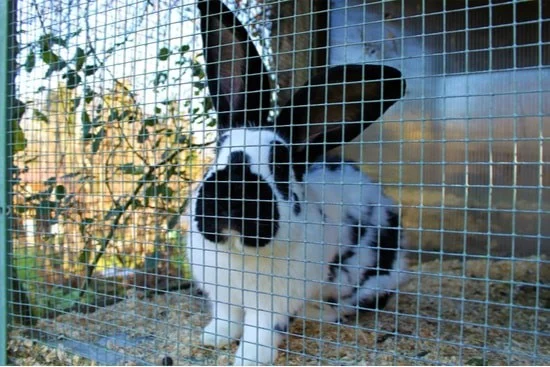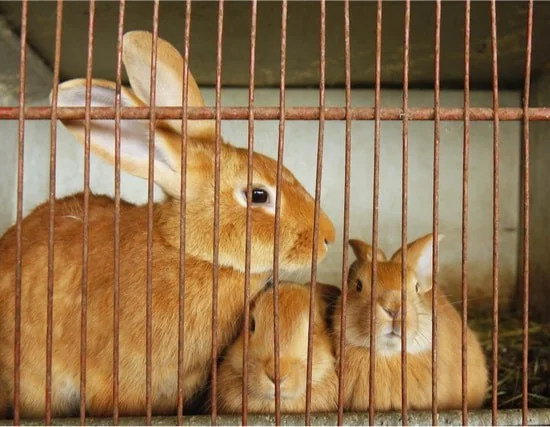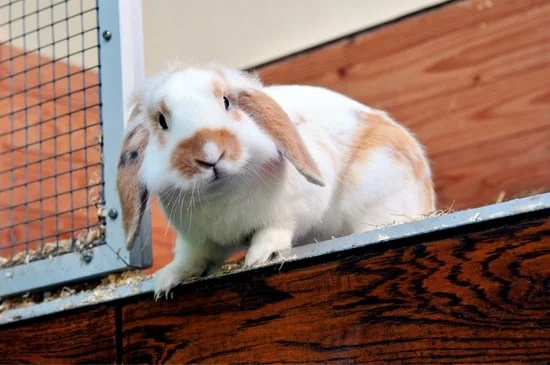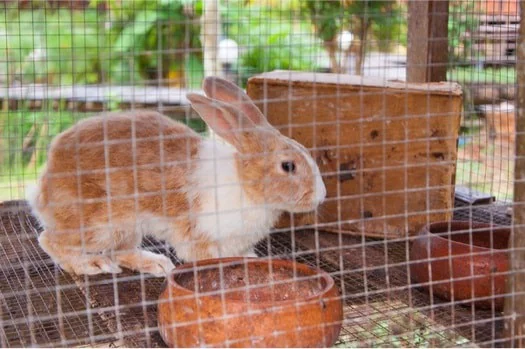Rabbits have a reputation for being quite smelly, but this is unfounded. In fact, rabbits only smell bad if they are kept in unhygienic conditions.
Choose a plastic cage rather than a wooden one as it’s easier to keep clean. And use absorbent bedding, such as paper pellets. Also, rabbits need a comfortable litter pan to go to the toilet. To control odor, you should clean the litter pan every 1-3 days.
But don’t just focus on the cage itself. Some rabbits smell because they’re sick, or because they’re eating the wrong foods. For example, a high-sugar-low-fiber diet can cause diarrhea. We’ll explore the various reasons rabbits smell and what you can do about it.
How to Keep a Rabbit Cage Smelling Fresh
If your house is started to smell like a farmyard, don’t despair. There are many things you can do to get rid of rabbit smells. Here are the most important steps:
- Clean and Disinfect the Rabbit Cage Regularly – Use the right cleaning products.
- Choose the Correct Bedding – Some types of bedding are unsuitable for rabbits and can make the rabbit odor worse. Here are the right bedding types for rabbits.
- Choose the Right Cage (or Hutch) – Some materials cling on to urine smells, whereas others are significantly easier to keep clean.
- Spay/Neuter your Rabbit – This reduces the tendency to spray. It may also change the smell of your rabbit’s wee.
- Litter Train your Rabbit – Litter training rabbits is vital for keeping the cage clean.
- Improve your Rabbit’s Diet – Certain foods can trigger diarrhea, UTIs, sticky bottoms, etc.
- Check for Health Problems – If your rabbit is smelly, this might indicate an underlying health problem. Also, the build-up of ammonia (a substance in wee) can cause health problems.
- Ventilate and Ionize the Air – Air fresheners and sprays only mask the smells.
So, if your rabbit’s cage is smelling, there are quite a few things you can try. Throughout this guide, we’ll review each suggestion in more depth.
Is It Normal for Rabbit Pee to Stink?
Although foul-smelling pee can indicate a urinary tract infection (UTI), this is not usually the case. Often, rabbit wee smells because it has been left too long.
Even minimal amounts of rabbit urine can fester and develop into a nasty stink. To be specific, when rabbit pee builds up, the ammonia in the wee starts to smell fishy.
So, if your rabbit’s cage smells of fish, the cage needs a deep clean. Either it is not being cleaned regularly enough, or it is not being cleaned thoroughly enough.
Do Indoor Rabbits Smell Bad?
Some people are reluctant to allow a rabbit indoors because they think the rabbit will stink the house out. But indoor rabbits only smell if they are kept in unsanitary conditions.
So, whether a rabbit lives indoors in a cage or outdoors in a hutch, she has the potential to be smelly. But if we clean her ‘home’ regularly, the odor will be minimal.
Why It’s Important to Keep a Rabbit’s Cage Clean
No one wants their home to smell like rabbit pee. But there are other downsides to rabbit pee. If you leave the pee to fester, your rabbit will be vulnerable to the following:
- Respiratory Problems – According to Academic OUP, exposure to ammonia (a substance in urine) slows down a rabbit’s respiration rate. So, if a rabbit is exposed to ammonia-soaked bedding for long periods, she may become lethargic and struggle to breathe.
- Urine-Soaked Fur – if your rabbit’s cage is dirty, or too small, she may end up sitting in her own urine. The fur can become soaked in urine (sometimes called urine scalding), and this leaves rabbits vulnerable to flystrike.
- Infections (Including Urinary Tract Infections) – These are more likely to occur in a dirty environment. And Urinary Tract Infections (UTI’s) can be life-threatening to rabbits.
- Sadness, Stress, and Discomfort – Rabbits are clean animals so they will become distressed if they live in a dirty cage. This can lead to behavioral problems, such as excessive chewing.
So, the kindest thing you can do for your rabbit is to keep her cage clean.
How Often Should I Clean My Rabbit’s Cage?
If you want to eliminate odors, you’ll need to clean your rabbit’s cage regularly. We often hear this advice, but what does “regularly” really mean? Well, a cage should be emptied and cleaned around once a week. This involves the following:
- Remove the bedding and dispose of it. Do not try and reuse any of the bedding, even if parts of it look clean.
- Add some mild detergent (washing up liquid) or an enzyme cleaner to warm water. Immerse the cage components in the water.
- Using a brush or stiff sponge, scrub the components. Pay particular attention to corner crevices to remove all traces of urine.
- Ideally, dry the parts in direct sun to avoid a residue.
- Spray disinfectant on each part and wipe over with kitchen towel.
- Leave to dry before adding fresh bedding.
Don’t put the cage back together when it is still damp as this could make the cage moldy.

How Often Should I Clean the Litter Pan?
If your rabbit is using the litter pan, this is the area of the cage that will be the smelliest. For this reason, it’s best to clean it every 1-3 days. In summer, rabbits tend to wee more, so it may be necessary to change it daily. Here are the steps to follow:
- Remove the litter pan from the cage and dispose of all the substrate.
- Add some mild detergent or enzyme cleaner to warm water. Immerse the litter pan and leave to soak for a couple of minutes before scrubbing.
- Once dry, wipe over with a disinfectant.
As the whole cleaning/drying process can take about an hour, it’s a good idea to have two litter pans. This will stop your rabbit from spraying in the corners of the cage while you’re cleaning the litter pan.
Cleaning Products for a Rabbit Cage
To keep rabbit odor under control, you’ll need the right cleaning products. Cleaning products need to be strong enough to cut through the ammonia, but gentle enough not to harm your rabbit. So, what products should you use to clean a rabbit’s cage?
- Mild Detergents (Such as Washing Up Liquid) – Once combined with warm water, this is good for soaking plastic components.
- Enzyme Washes – Biological washes are good because the enzymes break down the pee and poop. This means urine residues are not left behind in the cage or litter pan. Choose a pet-friendly version because some of these washes contain essential oils that may be harmful to small pets.
- White Vinegar – A mixture of 1-part vinegar to 1-part water is an effective disinfectant. It also dissolves calcium residues caused by sludgy urine, so it’s great for odor control.
It’s best not to use bleach because it can leave a residue that is very dangerous to rabbits. This is especially true if it comes into contact with wood. In contrast, vinegar residue is not harmful to rabbits, so it’s a much better disinfectant.
Odor-Control Rabbit Bedding
You can stop your rabbit cage from getting too smelly by choosing the right bedding. Any of the following are good choices:
- Paper-Based Bedding/Pellets – This is good because it is absorbent and odorless. Choose a formula that doesn’t contain baking soda as this may be harmful to rabbits. Brands such as Critter Care Natural and Yesterday’s News are good.
- Hardwood Stove Pellets (Chemical Free) – These are cheap and very absorbent.
- Hay on top of Newspaper – Newspaper alone is not very absorbent, but it can be a good option if you top it with hay. Hay has quite a distinctive smell, so it’s not ideal if you want an odorless rabbit bedding.
Rabbit Bedding to Avoid
The following rabbit bedding should be avoided, either because it’s dangerous for rabbits, or because it makes the rabbit odor worse:
- Crystal Cat Litter – Although this litter is good for odor control, it should not be used in rabbit cages. This is because rabbits may swallow and choke on the crystals.
- Clay Litter – This can cause respiratory problems in rabbits.
- Pine/Cedar Shavings – This type of litter can also cause respiratory issues. Added to which, it does not help to control odor.
- Deodorized or Scented Litter – These will only mask the smell of wee. And, in some cases, they can make rabbit pee smell even worse. Also, these litters can cause breathing problems.
There are some powders you can add to your rabbit’s litter, which are supposed to neutralize bad smells. Be very careful with these products because some contain baking power. Baking powder may be harmful to small pets because it can cause breathing problems.
Hygienic Cage Set-up for Rabbits
If you’re struggling to keep your rabbit’s ‘house’ clean, perhaps your cage is unsuitable for a rabbit. If so, it will be difficult to keep it clean and hygienic. So, when choosing a cage, consider the following:
- Choose Plastic – As mentioned, choose a plastic cage (rather than a wooden cage). Wood absorbs urine, so it’s challenging to keep it smelling fresh.
- Give Plenty of Space – Give your rabbit as much space as you can reasonably allow. If you squash your rabbit into a tiny cage, she may develop bad toilet habits. For example, rabbits tend to hold their pee when cramped environment. This can lead to UTI’s.
- Access to Hay from the Litter Pan – Most rabbits will be more inclined to use their litter pan if there is Hay to chomp on. Try to keep the hay away from the base of the litter pan, but near enough so that your rabbit can reach it.
- Keep Water Away from Litter Pan – Water spillages can make a cage smell worse, so try and keep your rabbit’s water bowl well away from the litter pan. Use a heavy bowl that cannot be turned over easily.
- Accessible Corners – If you build a cage yourself, make sure the corners and crevices are easy to access for cleaning.
- Plenty of Ventilation – This will keep them happy and eliminate any unpleasant smells. So, try to position your cage in a room with lots of ventilation, though don’t let the cage sit in a draught. Though rabbits can tolerate low temperatures, they can die from fluctuating temperatures or being forced to sit in a draught.

How to Litter Train Your Rabbit
If your rabbit is not litter trained, this will make the cage smelly. Although untrained rabbits pee in the same corner each time, it’s difficult to wash this corner unless you clean the entire cage. But, if you have a removable litter pan, you can clean this as soon as it starts smelling unpleasant.
So, how can you litter train a rabbit? Well, here are the steps to follow:
- Clean the hutch to remove any traces of urine. Set aside a small piece of urine-soaked bedding.
- In the spot where your rabbit usually urinates, place a litter pan. And on the tray, put the piece of urine-soaked bedding. Leave your rabbit in the cage for a couple of hours.
- Your rabbit may immediately pee or poop in the litter tray. If not, move the tray to wherever they try to eliminate. Be persistent, but don’t shout at your rabbit for getting it wrong.
- If your rabbit poos outside the litter box, move the droppings into the litter tray and leave her there for a while.
- In fact, leave any pee/poop in the tray for 24 hours to let your rabbit know that she is doing the right thing.
Some rabbits take longer than others to get the hang of it. Often, it’s easier to litter train a rabbit once they’ve been neutered.
Neutering/Spaying your Rabbit
If your rabbit is intact, this may explain why their cage is smelly. Intact rabbits have hormonal shifts that can make their wee smell very funny. Also, intact males are more likely to spray, so they’ll cause more of a stink.
According to Rabbit Welfare, neutering is vital for a long and healthy life. Not only does it reduce spraying and smelly urine, but it also protects against uterine cancer (in females), and other diseases.
Healthy Diet
If your rabbit has smelly poop or pee, she may not be eating a species-appropriate diet. To be specific, if rabbits eat a low fiber diet, they may suffer from:
- Bloating
- Gastrointestinal Stasis
- Urinary Tract Diseases
- Diarrhea
- Dirty Bottoms
- Enteroteoxema (a life-threatening bacterial infection of the intestines)
So, to prevent these conditions, make sure your rabbit is eating enough fiber. As a bare minimum, all rabbits should be provided with:
- Unlimited Grass Hay – Timothy hay is a great option
- Leafy Greens – 1 cup per pound of body weight per day
- Unlimited Water
In addition to the basics, you can add (or subtract) a few foods from your rabbit’s diet to help control odor.
Cilantro (Coriander)
Although there’s not much evidence to back it up, some people believe that coriander causes foul-smelling wee. If your rabbit grazes on this herb, try replacing it for basil, mint, or parsley.
Chlorophyll
Chlorophyll is thought to reduce the smell of rabbit urine. Chlorophyll is plentiful in green grass, so try to let your rabbit graze on growing grass. It’s best not to give your rabbit chlorophyll supplements as it’s easy to overdose on these, and we cannot be sure if they are healthy for rabbits.
Speak to your vet before adding any supplement to your rabbit’s diet as rabbits are very sensitive creatures. Even small dietary changes can be life-threatening.

Health Problems in Smelly Rabbits
If your rabbit smells no matter how often you clean the cage, perhaps an underlying disease is to blame. Some of these conditions have already been mentioned, but let’s review the health problems that can cause a rabbit to be smelly:
- Gastrointestinal Stasis – This can lead to diarrhea and a dirty bottom.
- Urine Scalding (Perhaps Leading to Fly Strike) – This can make the fur damp and smelly.
- Urinary Tract Infections – These can sometimes cause foul-smelling urine.
- Fracture/Arthritis /Heat Stroke – Meaning they cannot groom themselves. In turn, this can lead to urine scalding.
- Dental Disease – This can cause smelly breath.
- Stress – Rabbits are extremely sensitive creatures. Stress (something as simple as changing the position of the cage) can cause them to stop grooming.
Some of these diseases are caused by a dirty cage, to begin with, so keeping your rabbit’s cage clean will help to prevent some of these issues.
Will Air Freshener Get Rid of Rabbit Odor?
If your house is starting to smell, you might buy a few air fresheners to get rid of the smell. The problem is, air fresheners only mask the smell. Added to which, air fresheners can cause rabbit snuffles (breathing problems). So, are there any alternatives?
- Ventilation – it might sound obvious but ventilating each room in the house is an excellent place to start. Leaving each window ajar can help to eliminate bad odors. But remember not to place your rabbit’s cage in a draught.
- Air Ionizers – Air ionizers purify the air by electrically charging the molecules in the air. They are especially good for people with smelly pets or allergies because they can remove allergen particles and odors from the air. These air purification systems may even help to prevent rabbit snuffles, though there is no clinical evidence to back this claim up.
Bathing a Smelly Rabbit
If your rabbit is very smelly, you might wonder if it’s time to bath them. According to PETA, you should only bath a rabbit if it’s necessary. For example, if:
- There is urine scalding and a risk of flystrike
- Your rabbit has a very dirty bottom (again, there’s a risk of flystrike)
- Your rabbit is old or weak back legs and needs help to groom
If that’s the case, your rabbit will probably benefit from a wet bath. Some people prefer to let their vet do this, but if you want to try it at home, the steps are outlined below.
How to Bathe a Rabbit
Rabbits can be bathed according to the following method:
- Fill the sink with 2 inches of tepid-to-warm water. And add some specialist rabbit shampoo.
- Ask another person to hold your rabbit above the sink, while you lather up the rabbit’s legs and underside. Only go as high as necessary and try not to splash water near the rabbit’s face.
- Once you’ve rubbed the rabbit shampoo in, take a jug of tepid water and rinse.
- Dry your rabbit with a microfiber towel.
Some rabbits will not tolerate a wet bath at home, in which case it’s best to visit your vet or a specialist rabbit groomer.
Should a Smelly Rabbit Live Outdoors?
If your indoor rabbit starts to smell, your first reaction may be to move her outdoors. There’s nothing wrong with a rabbit living outside, but you should have a valid reason for moving her.
If you send your rabbit outdoors without investigating the smell, you could miss something sinister.
Also, you’ll probably find that your rabbit smells just as much outdoors. Outdoor hutches tend to smell worse because they are made of wood. Wood absorbs urine.
So, by all means, let your rabbit live outdoors. But, first, investigate why your rabbit is smelling.
Safely Removing Rabbit Odor
Here’s a summary of what is safe and what is not safe to do when dealing with rabbit odor{
| Safe | Not Safe |
|---|---|
| Clean the litter tray and cage with warm water and mild detergent (or enzyme cleaner). Disinfect with a mixture of white vinegar and water. | Clean the cage with bleach or other harsh cleaners. |
| Provide a high fiber diet. This means unlimited grass hay, a few cups of fresh green veg, and unlimited water. | Withhold essential foods (hay, green veg, or water) to try and tackle the problem. |
| Eliminate cilantro/coriander from your rabbit’s diet. | Feed high-carbohydrate foods (muesli, biscuits, too many pellets, etc.). |
| Allow your rabbit to graze on growing grass where possible (the chlorophyll may prevent stinky wee). | Chlorophyll supplements (or any other supplement) without a vet’s approval. This especially applies to Yucca extract, as there is intense disagreement over the safety of this supplement. |
| Gently litter train your rabbit. | Punish your rabbit for eliminating in the wrong place. This can lead to intense stress. |
| Try a more hygienic cage set-up. E.g.: Choose a plastic cage, reposition the litter tray, or increase the size of the cage. Remember to make any changes gradually as rabbits take time to adapt. | Move the rabbit outdoors so that you can ignore the smell. |
| Find a heavy water bowl and position it far away from the litter pan. | Switch to a water bottle because the dish keeps getting knocked over. Most rabbits prefer a water bowl, so try to make one available. |
| Use a rabbit-safe, absorbent litter. E.g.: Paper pellets, hardwood stove pellets or hay on top of newspaper. | Clumping litter, clay litter, pine or cedar shavings, or deodorized/scented litter. Powdered litter fresheners that contain baking powder. |
| Ventilate the house (but be wary of draughts). Use an air ionizer to eliminate odors. | Air fresheners, perfumes, or essential oil diffusers. |
| Give your rabbit a wet bath if there is a risk of fly strike. Wet baths should be performed with care. If you don’t feel confident, you can ask a vet or rabbit groomer to show you. | Unnecessary baths. Bathing causes stress, so it should only be done when necessary. Human shampoo products. |
Rabbits are, by nature, very clean animals, so it shouldn’t be too difficult to get rid of rabbit odor.
As you’d expect, the most effective way to get rid of rabbit smells is to keep the cage spotless. But, if the smell is still lingering, take a look at the bigger picture.
Is your rabbit eating a high-fiber-low-sugar diet? Do they have enough space in their cage to feel comfortable? Are there any symptoms of illness?
Do not make the mistake of ignoring or masking the smell. Instead, get to the root of the problem. That way, you’ll have a healthier and happier rabbit.

